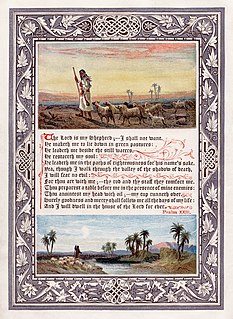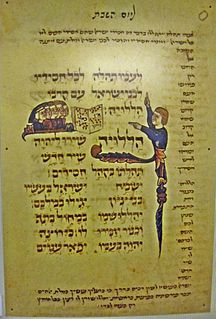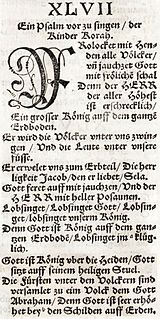In chant, a reciting tone can refer to either a repeated musical pitch or to the entire melodic formula for which that pitch is a structural note. In Gregorian chant, the first is also called tenor, dominant or tuba, while the second includes psalm tones as well as simpler formulae for other readings and for prayers.

Psalm 23 is the 23rd psalm of the Book of Psalms, generally known in English by its first verse, in the King James Version, "The Lord is my Shepherd". The Book of Psalms is the third section of the Hebrew Bible, and a book of the Christian Old Testament. In the Greek Septuagint version of the Bible, and in its Latin translation in the Vulgate, this psalm is Psalm 22 in a slightly different numbering system. In Latin, it is known as "Dominus reget me et nihil mihi deerit".

Psalm 103 is the 103rd psalm in the biblical Book of Psalms. The first verse attributes it to King David, the author of many Psalms. It is a hymn, beginning in English "Bless the Lord, O my soul" (KJV). J. A. Motyer of Trinity College, Bristol describes it thus: "The blend of changeless fatherly care and endless sovereign rule is the distinctive stress of this Psalm." In the Greek Septuagint version of the bible, and in its Latin translation in the Vulgate, this psalm is Psalm 102 in a slightly different numbering system.

Psalm 91 is the 91st psalm of the Book of Psalms, generally known in English by its first verse in the King James Version: "He that dwelleth in the secret place of the most High shall abide under the shadow of the Almighty." In the Greek Septuagint version of the Bible, and in its Latin translation Vulgate, this psalm is Psalm 90 in a slightly different numbering system. In Latin, it is known as 'Qui habitat". As a psalm of protection, it is commonly invoked in times of hardship. Though no author is mentioned in the Hebrew text of this psalm, Jewish tradition ascribes it to Moses, with David compiling it in his Book of Psalms. The Greek Septuagint translation of the Old Testament attributes it to David.

Psalm 145 is the 145th psalm of the Book of Psalms, generally known in English by its first verse, in the King James Version, "I will extol thee, my God, O king; and I will bless thy name for ever and ever". The Book of Psalms is the third section of the Hebrew Bible, and a book of the Christian Old Testament. In the Greek Septuagint version of the bible, and in its Latin translation Vulgate, this psalm is Psalm 144 in a slightly different numbering system. In Latin, it is known as "Exaltabo te Deus meus rex". The psalm is a hymn psalm.

Psalm 137 is the 137th psalm of the Book of Psalms, and as such it is included in the Hebrew Bible. In English it is generally known as "By the rivers of Babylon", which is how its first words are translated in the King James Version. It is Psalm 136 in the slightly different numbering system of the Greek Septuagint and the Latin Vulgate versions of the Bible. Its Latin title is "Super flumina Babylonis".
The Ashrei is a prayer that is recited at least three times daily in Jewish prayers, twice during Shacharit and once during Mincha. The prayer is composed primarily of Psalm 145 in its entirety, with a verse each from Psalms 84 and 144 added to the beginning, and a verse from Psalm 115 added to the end. The first two verses that are added both start with the Hebrew word "ashrei", hence the prayer's name.
The Psalm 92, known as Mizmor Shir L'yom HaShabbat, is ostensibly dedicated to the Shabbat day. Though it can be recited any day, it is generally reserved for Shabbat and is also recited during the morning services on festivals.

Psalm 149 is the 149th psalm of the Book of Psalms, a hymn as the book's penultimate piece. The first verse of the psalm calls to praise in singing, "Sing a new song unto the Lord". Similar to Psalm 96 and Psalm 98, Psalm 149 calls to praise God in music and dance, because he has chosen his people and helped them to victory. Psalm 149 also calls to be ready to fight.

Psalm 42 is the 42nd psalm of the Book of Psalms, generally known in English by its first verse, in the King James Version, "As the hart panteth after the water brooks, so panteth my soul after thee, O God". The Book of Psalms is the third section of the Hebrew Bible, and a book of the Christian Old Testament. In the Hebrew Bible, Psalm 42 opens the second of the five books (divisions) of Psalms. In the Greek Septuagint version of the bible, and in its Latin translation in the Vulgate, this psalm is Psalm 41 in a slightly different numbering system. In Latin, it is known as "Sicut cervus". The psalm is a hymn psalm. It is one of twelve psalms attributed to the sons of Korah.
Gelineau psalmody is a method of singing the Psalms that was developed in France by Catholic Jesuit priest Joseph Gelineau around 1953, with English translations appearing some ten years later. Its chief distinctives are:

Psalm 93 is the 93rd psalm of the Book of Psalms, generally known in English by its first verse, in the King James Version, "The Lord reigneth, he is clothed with majesty". The Book of Psalms is part of the Hebrew Bible and the Christian Old Testament. It is Psalm 92 in the slightly different numbering system of the Greek Septuagint and Latin Vulgate versions of the Bible. Its Latin title is Dominus regnavit, decorem indutus est. It is the first of a series of psalms which are called royal psalms as they praise God as King.

Psalm 19 is the 19th psalm in the Book of Psalms. It is ascribed to David.
Psalm 44 is the 44th psalm from the Book of Psalms, composed by sons of Korah and is classified in the series of lamentations of the people. In the Greek Septuagint version of the bible, and in its Latin translation in the Vulgate, this psalm is Psalm 43 in a slightly different numbering system.

Psalm 47 is the 47th psalm of the Book of Psalms, generally known in English by its first verse, in the King James Version, "O clap your hands". The Book of Psalms is the third section of the Hebrew Bible, and a book of the Christian Old Testament. In the Greek Septuagint version of the bible, and in its Latin translation in the Vulgate, this psalm is Psalm 46 in a slightly different numbering system. In Latin, it is known as "Omnes gentes plaudite manibus". The psalm is a hymn psalm. It is one of twelve psalms attributed to the sons of Korah, and one of fifty-five psalms addressed to the "Chief Musician" or "Conductor".

Psalm 114 is the 114th psalm of the Book of Psalms. In the Greek Septuagint version of the bible, and in its Latin translation in the Vulgate, this psalm is Psalm 113 in a slightly different numbering system.

Bruckner's Psalm 114, WAB 36, is a psalm setting of verses 1 to 9 of a German version of Psalm 116, which is Psalm 114 in the Vulgata.
Lobe den Herrn, meine Seele, BWV 143, is an early cantata by Johann Sebastian Bach. He appears to have composed the cantata for New Year's Day, probably when he was in his 20s, but whether it was first performed in Mühlhausen or Weimar is not known: the date of composition is unclear. Bach's authorship has been doubted because the cantata has several ununusual features; one of these is the scoring, it is the only Bach cantata to combine three corni da caccia with timpani.










